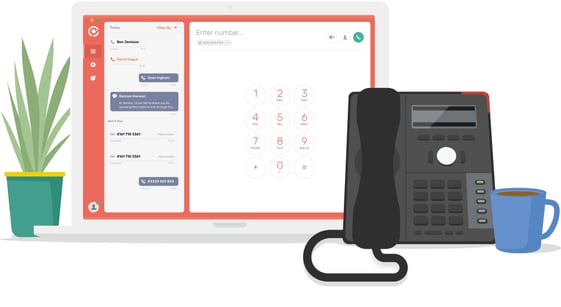VoIP vs landline for business phone systems is a hotly contested debate. Some businesses made the switch to VoIP years ago whilst others couldn’t dream of not using their reliable landlines. But, just because VoIP is newer, does it mean it’s better?
We’ll compare the two systems and try to declare a winner. We’ll compare factors such as cost, security and features.What is a Landline?
A traditional choice for many business phone setups, using analog systems that run using a telephone company’s copper wiring that connects to your telephone socket. Switch boxes connect two different phones for a call to take place. They’re pretty much the same systems that were set up in the 1800s and have stood the test of time. They’re reliable and generally easy to maintain with nearly 100% uptime.
What is VoIP?
VoIP stands for Voice over Internet Protocol. Some providers might try and confuse you with jargon but, basically, it’s just a phone service using the internet. Any business with a reasonable internet connection can use the internet for phone calls, rather than a traditional landline.
Is VoIP better than Landline?
The internet is very accessible and is one of the main reasons why VoIP technology has seen considerable growth in recent years. A recent study found that the UK had the fastest adoption rate of VoIP services - over one-third of UK-based companies migrated to cloud phone services in 2019. We expect this to have increased further due to the pandemic during 2020.
VoIP Advantages and Disadvantages for Business
Millions of people and businesses around the world have already switched to a VoIP based phone system - it gives you access to a more modern approach to business communication that’s always being updated and improved.
Here we’ve weighed up the pros and cons of VoIP:
| Advantages | Disadvantages |
| Runs at a lower cost | Relies on the quality of your internet connection |
| Cost-effective to set up and maintain | Limited location tracking for emergency calls |
| Easy to set up and configure | Less flexible than Cloud-based options |
| Can use desk phone, mobile or computer to send and receive calls | Power outages that disrupt the internet connection completely shut off some VoIP systems. |
| Flexible and portable | |
| Useful features e.g call waiting, forwarding, blocking |
VoIP vs Landline Costs
One of the main advantages of VoIP is the lower cost. Businesses that have a landline connection will be connected through a PBX (Private Brand Exchange) - this is a piece of hardware that connects many of the phones in an office environment. Initial installation can be costly, and depending on the provider or phone package, there are other additional costs such as line rental, connection charges.
The ability to scale landline phones can be another costly exercise, so for fast-growing businesses this can be a nuisance.
There are no initial setup costs with VoIP as the phone system is run through your internet connection. Other cost-saving benefits include:
- No installation or extra hardware costs
- No maintenance or upkeep charges
- Cheaper call costs, due to fall data carriage charges and better broadband speed
- Cheaper domestic and international calls to both mobile and landline
VoIP Business Features
There is no doubt that VoIP phone systems can have a positive effect on a businesses bottom line, but they can also have added value by the way of powerful business features that your teams can utilise. Enhancing productivity and call handling ability.
Features that are unique to VoIP are:
- Virtual numbers
- Call analytics
- Integrations
- Click to call
- Filterable activity feed
VoIP vs Landline Security
Security is another important factor to consider when weighing up which phone system is best, and when it comes to security neither are 100% safe and secure. It is possible to hack both communication methods.
As a landline is a physical connection within an infrastructure, they are reasonably secure and it would take some going to intercept. VoIP calls on the other hand, can be protected using different methods of cybersecurity. Things like Firewalls, encryption, VPNs (Virtual Private Network) and virus and malware protection can all strengthen the security of a VoIP phone system. Which is crucial when different kinds of data, like video and SMS can be transferred via VoIP. Especially, because data can be stored and manipulated in ways that a landline call can not.
Landline Advantages and Disadvantages for Business
In 2018, time spent on landlines accounted for more than 44bn minutes of call time. And, over the next few years it’s likely that this will decline quickly with the PSTN and ISDN switch off scheduled for 2025. Over the next few years businesses will be forced to review their phone systems and make a switch. But, for now let’s look at why the landline has stood the test of time.
| Advantages | Disadvantages |
| Reliable and effective with almost 100% uptime. | More expensive in short and long term |
| Easy to use and maintain | Long contracts |
| Not affected by power outages | Obsolete technology that isn’t regularly updated |
| Stable calls, not affected by internet connectivity | Difficult to repair |
| Excellent call quality | Immovable, fixed hardware |
| Operates on purpose built network |
Do you stick with a traditional favourite for a little longer or upgrade to something new? In addition to VoIP there’s another modern alternative. A new kind of business phone system that offers a reliable service, calls on the go and all the features you could ever need.
Cloud-Based Phone Systems for Business
Everything else in your life is controlled through apps, so why should your business’ telephone system be any different? A cloud-based phone system for startups and growing businesses alike, works through powerful desktop and mobile apps that let you make calls on the move, allowing staff to work wherever they are. It’s an extension to VoIP, it’s the same functionality but the data is stored virtually.
Using sophisticated apps allows providers to implement a wide range of features that improve business efficiency and productivity. Smart notifications and a live activity feed keep the whole team connected and updated. Other powerful features include cloud call recording and conference calling.
With virtual numbers, you can switch between local, national and international phone numbers to conduct truly global business. Integrate with devices and software your business already uses and take advantage of all the tools you need in one place.
The latest app systems offer 24/7 customer support so that any issues are dealt with quickly and without fuss. They’re also available without setup fees and hardware costs so are a cost-effective solution.
Unlike with traditional options, there’s usually no unnecessary paperwork or contract to sign with app based systems. So if you don’t like the service, you can just leave.
It’s worth speaking to an expert before making any important decisions regarding your phone systems, especially as the industry is moving and changing so quickly.
Need Help Finding the Right Phone System?
Choosing a phone system for your business is an important decision as it needs to drive productivity and help your business to grow.
Business needs from a VoIP phone system can vary by industry, for example, if you’re working in a not for profit organisation your priorities are likely to be different to those who are working in financial services. Additionally, if you're a new startup, your needs will be different to those that are larger and more established.
Our website is packed with useful information that can help you to decide what you need based on your business requirements. Go check it out. And if you’re still not convinced, arrange a free demo, or start a free 7 day trial.
.png)




